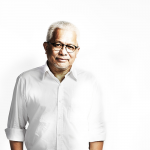The team behind Mastermind Group gleefully posing after successfully wrapping up a pre-pandemic shoot
In the ever evolving landscape of advertising in Malaysia, industry players have been quick to adapt to the psychology of consumer behaviour and data analytics. A flash KFC ad on your social feed might trigger a hungry stomach to get that lunchtime deal but it doesn’t necessarily induce any feelings of brand loyalty or brand association. PETRONAS, on the other hand, may not incentivise us to drive 5kms beyond our closest gas station, but it does bring a certain feeling of pride and relatability, largely thanks to the late Yasmin Ahmad’s involvement in festive ads.
While brand films have now become a global trend, the Malaysian incarnation has its roots firmly in our unique experiences.
Mastermind Group, a homegrown 12 year old production house, has successfully etched its signature by amalgamating client needs with stories that are true to the nature of its people. The tale of Mastermind Group traces back to its founders’ roots in storytelling across commercials, films and television. commercials itself.
Founded by Jehan Miskin in 2009, Mastermind Group’s birth as a production house was driven by his passion and mission to create content that was authentic and exciting.
While Jehan is most commonly known for his acting roles in Malaysian films and tv series,his roots in production began at the start of the new millennium when he joined the industry as a commercial producer.
According to Jehan, interestingly, his decade’s worth of experience as an actor taught him how not to do things. Experiencing production from both sides – in front of the camera and behind it – has given him a unique lens of industry and helped him identify its cracks. Hence, Jehan’s journey as commercial producer turned actor turned production house founder and director , has tremendously shaped Mastermind Group’s philosophy and culture as a whole.
The production house’s philosophy is simple yet persuasive. It’s mission is to bring great ideas to life on screen by reflecting its audience’s values and realities veraciously (as veracious as one can be in Malaysia).
And this philosophy has proven successful for Mastermind Group as evidenced by its loyal clientele which include some of the largest MNCs in Malaysia.
Brands and agencies are drawn to the production house because the talent diversity amongst the team behind Mastermind Group enables them to consistently produce a wide range of genres for different clients. For example, just for the Raya celebration this year, they produced four award winning TVCs that evoke completely different emotions.
The film produced for Atlas Vending, ‘The Magic Pantry’, was a story that was given life out of the question ‘What if the products dispensed by the Atlas vending machine conjured up memories of loved ones to comfort them in their time of need?’ This creative direction perfectly aligned with Atlas’s tagline and value proposition which was ‘Dispensing Delight’ and the film inevitably tugged viewers’ heartstrings especially as they related to the warm and nostalgic moments conjured up during tough times.
Another TVC for Raya this year was done for Mitsubishi Malaysia. The film, ‘Ikan Besar’, was inspired by the film ‘Big Fish’ where the father told imaginative tall tales to his son. The team at Mastermind Group wanted to tell an adventurous story featuring the Mitsubishi Xpander in action. However, as ‘Balik Kampung’ was not possible during this Raya season due to restrictions on interstate travel, an adventure that turned out to be a tall tale told by Jihan Muse to her son was a great way to resolve both objectives simultaneously.
MARKETING Magazine had the opportunity to pick Jehan’s brain on several different things related to the production industry including the importance of nurturing and developing local talents as well as the challenges the creative industry faces in Malaysia.
The following is the candid and inspiring interview:
MM: As the EP of Mastermind Group, what would you say is the company philosophy behind producing creative outputs?
JM: We are storytellers at heart, and nothing is more satisfying than seeing an idea imagined in the mind come to life on screen. Technology constantly changes how we consume content, but audiences will always be drawn to fascinating stories, no matter the medium.
MM: While engaging audiences through storytelling has always remained one of the most popular techniques in marketing, how would you say the standard in producing onscreen genuine stories have shifted as more brands have adopted video as a marketing/advertising medium?
JM: In recent years, video has become so ubiquitous that it is now a universal language understood the world over. The shift to storytelling in branding that has happened in recent years is great for filmmakers as it allows us to explore a diverse range of stories from our own society from multiple perspectives and that is always fun.
MM: Based on the group’s experience in producing creative work, what would you say draws Malaysians when it comes to video ads?
JM: Audiences nowadays are very video savvy and are exposed to a huge variety of stories. To pierce through the flood of content available, the spot has to offer a fresh perspective in addition to being entertaining. Surprising audiences with something unexpected will always garner great responses. Real and relatable stories also never go out of fashion because audiences will always hunger for meaningful and truthful content that reflects their own reality or that of society.
MM: As a production house, you’ve won quite big at the recent awards for festive films. What would you say is the importance of festive films in Malaysia?
JM: Festive films are important as they are our stories that reflect and shape culture over time. These are the stories we tell of ourselves that become a part of our ever evolving sense of identity.
I once celebrated Raya (Eid) in Kazakhstan, and was surprised to see that it felt like just a normal day. There were no lagu Raya, no baju Raya and not even hiasan Raya around the city. The locals told me that their culture had been suppressed during the country’s time under the Soviet Union empire. Contrast that to Thailand, which has never been colonised and has a strong culture and identity that is intact through the generations. That’s one of the reasons Thai brand films are some of the best and most unique in the world.
MM: How do you see festive films evolving over the next few years as ideas become overdone?
JM: Content that is genuine will always strike a chord with audiences, especially if it is timely and relevant. Life imitates art and vice versa, so I’m excited to see how festive films will evolve with society’s growth and evolution too.
MM: Can you tell me more about how the film industry in Malaysia nurtures and develops on screen and BTS talents?
JM: The most precious resource in creating great screen content is talent, and skills are usually developed on the job through real world experience, via an informal apprenticeship. Mastermind’s has always prioritised our team’s development as filmmaking is a team sport, and to create excellent work, every single unit has to perform at a high level. Malaysia is still in its infancy when it comes to creating world class content, and many more opportunities will open up to budding filmmakers as our industry improves and develops.

MM: How do you see the production scene in Malaysia evolving post-pandemic?
JM: There was a very strong rebound in production demand across the board in between MCO 2 & MCO 3, so there is much hope for a strong rebound after this lockdown too. Technologies that have been adopted during the pandemic in production like remote shoots, remote editing, live streaming etc will become a common part of the producers toolkit.

MM: Can you give me some examples of films you’ve produced for clients that resulted in better audience reach than you expected? What made these films special?
JM: One of the most exciting things about putting out creative work is it takes on a life of its own, which can turn out differently from our expectations. We have been fortunate to have made films that resonated strongly with audiences that garnered viewerships that surpassed our expectations.
A recent example of that would be Etiqa’s 2021 Chinese New Year brand film. It was a risky story that was based on SPM, whose fate was very uncertain at the time. Would it be postponed or cancelled? Will it be conducted online or offline? We also weren’t sure if it would be too niche of a story to be enjoyed by a wider audience. However, so far it’s received over 11 million views and we could tell from the engagement that people related well to it, so yeah, it’s one of those times a gamble paid off!
MM: What are some of the challenges of being in a creative industry in Malaysia?
JM: Oh wow where do I start! A big one is probably the fact that our industry has never been taken seriously by the government. It is perceived by policy makers as entertainment/social and is not considered an important industry to the Malaysian government(until they need some propaganda done), as opposed to other countries like South Korea, who understand that colonisation (of the mind) can be done via ‘entertainment’.
Another big one is censorship. We live in a time that audiences are hungry for fresh and bold content. The limitations placed on filmmakers by regulators not only limit the content we can put out, but it also limits what audiences get accustomed to consuming, which makes it harder to serve them something new. That is why digital content is great as there is a direct link between the content creator and immediate feedback from the audiences without the need of a third party ‘big brother’ telling you what you can and cannot do.
A society that censors its truth seekers, be they filmmakers, satire artists, musicians or writers, will never fully flourish
MM: How has technology changed the game for production houses in Malaysia and how will it affect the emergence of smaller/boutique production houses given the budget disparity between them and bigger agencies/companies?
JM: Technology has democratised our industry for sure and this can be seen from the shift from a small number of big production houses in the 80s and 90s to a multitude of smaller production houses we have now. The tools matter less as they become cheaper and more accessible and the skills and imagination of the filmmaker becomes the true value proposition for creating exciting content.
MARKETING Magazine is not responsible for the content of external sites.











